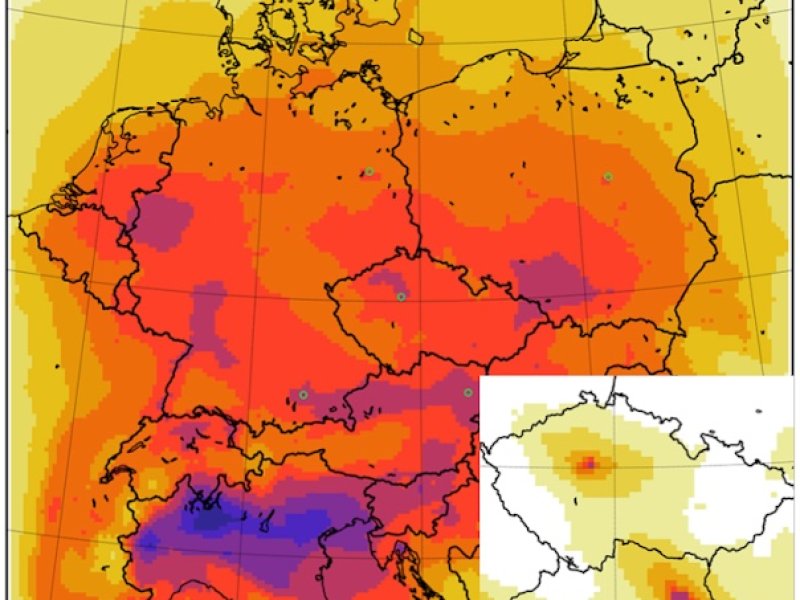Modeling the impact of urban vegetation on urban ozone pollution
Advisor: Peter Huszar (DAP CUNI)
Funding: Fully funded
Contact: peter.huszar@matfyz.cuni.cz
Funded PhD position with contract is opening at the Department of Atmospheric Physics at Charles University, Prague, Czech Republic aiming at modeling the impact of urban vegetation on air quality over urban areas.
Reference Code for the application: DCU25–1
Euraxess: https://euraxess.ec.europa.eu/jobs/316357
Description: Urban air pollution represents a large health burden to its population so understating the control mechanisms determining the spatio-temporal distribution of key pollutants is crucial. Ozone belongs to one of the most important pollutants in urban environment produced during the warm season via the reactions of VOC and NOx within photochemistry triggered by solar radiation. As vegetation represents a flux of natural VOC called biogenic VOC, it is clear that urban vegetation has to be considered as BVOC emitter. Moreover, the importance of urban BVOC emissions lie also in the fact that they are emitted within a NOx-rich environment, so they efficiently contribute to ozone formation. Urban vegetation acts also as a sink for ozone and its precursors via dry-deposition. Lastly, urban vegetation changes the albedo and water evaporation in cities and may have impact on the air flow so in general it modifies the meteorological conditions. These are however complex non-linear processes, thus to quantify the urban ozone budget and the role of urban vegetation, chemistry transport models have to be applied at high resolution coupled to regional scale meteorological models including urban canopy models over the selected urban areas. Outcome of a successful research will be an high resolution estimate of biogenic emissions fluxes in urban and rural areas and the quantification of their impact on tropospheric chemistry over both urban and rural areas. Also the role of urban meteorological conditions will be examined. The student will gain a solid understanding of processes responsible for urban ozone formation and removal: photochemical production from anthropogenic and biogenic precursors, dry-deposition and transport.
Specific tasks:
- High resolution input data on urban landcover (vegetation) over central Europe will be compiled to feed the biogenic emissions model with accurate data including plant-functional-type (PFT) and leaf-area-index (LAI) data.
- Familiarizing with the chemistry transport model CAMx which will be used to model the impact of urban BVOC on ozone concentrations. CAMx will be applied over selected central European cities at high resolution (1 km x 1 km).
- Besides the impact of emissions, the student will analyze also the impact of dry-deposition on ozone due to presence of urban vegetation.
- The role of urban vegetation in modifying urban meteorological conditions will be also examined
- Lastly, the research will cover the quantification of the impact of possible future urban green scenarios of urban ozone.
The tasks will be fulfilled within the project of the Czech Technological Agency No: SS02030031 – “Integrated system of research, evaluation and control of air quality” (ARAMIS), the project Horizon Europe “Non-CO2 Forcers And Their Climate, Weather, Air Quality And Health Impacts” (FOCI) no. 101056783 and the project OP JAK “Georisks” CZ.02.01.01/00/22_008/0004605. The successful candidates will join a young and ambitious research team at the Charles University working within the Atmospheric Chemistry Modelling Group and, within the project, will collaborate with other Czech research institutes (Czech Hydrometeorological Institute, Czech Academy of Sciences etc.). The Ph.D. study of the candidates will be fully funded, partly from the mentioned project and partly as a regular monthly stipendium, together making about net 1500 EUR/month income (the stipendium is gradually increasing during the study – for details about the phd studies at the department of atmospheric physics, please visit: https://www.mff.cuni.cz/en/physicsphd/f8/program-overview
Requirements:
- Master-of-Science-equivalent degree in meteorology and/or environmental physics with fulfilled courses of atmospheric chemistry and physics.
- The candidate should have good to very good experience in Unix / Linux scripting and programming skills in Python, SQL or Fortran.
- Strong communication in English language (spoken and written)
- Willingness to interact with an interdisciplinary science community
- A creative mind-set for scientific research
Assets:
- Previous experience in modeling biogenic emissions and air pollution transport using chemistry transport models is considered as a great asset
- Experience with GIS software
Application: Please send your application by March 31, 2025 to kfa@matfyz.cuni.cz
Please include:
- Academic CV and a pdf of your diplomas including (link to the) the diploma thesis
- List of course topics related to meteorology, air quality, climate modelling or atmospheric physics
- Specification of programming and language skills
- List of publications (if any)
- List of research projects (if any)
- Statement of research interests and career goals, indicating why you are interested in the position
- List of at least two references: names, phone numbers, and email
After the selection of the candidate (during April) and the approval of the supervisor of the phd project, an official application has to be submitted to the faculty (to be specified later with the selected candidate).
Information on deadlines, how to apply and what is required in general can be found at Application.
Further information about our department can be found here.


